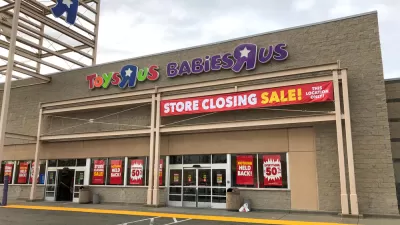To deal with the problem of vacant big-box stores that have proliferated across the country, one Milwaukee suburb is levying a fee on developers to help pay for demolition. Other cities are exploring similar options.
"Like many communities across the country, Wauwatosa has taken steps to protect itself against so-called ghost boxes, the hulking remains of what are often big box stores left vacant when retailers downsize or relocate.
Many see measures such as Wauwatosa's, which assesses developers a fee that can be used for demolition if needed, as counterproductive to attracting new business.
But recent announcements of store closings by Home Depot and Linens 'n Things - and concerns that more could follow - have some economic development officials reconsidering."
"Wauwatosa's provision, adopted as part of its big-box ordinance in 2005, requires developers of buildings 50,000 square feet and larger to set aside 20 cents a square foot in the city's land conservation fund - about $28,000 in Lowe's case - which can be tapped to raze the building if it sits empty for more than a year.
"This is exactly the climate we were anticipating when we adopted this," Wauwatosa Community Development Director Nancy Welch said shortly after Home Depot announced this month that it would close 15 stores, including three in Wisconsin.
Widely criticized in the development community at the time, Wauwatosa's provision has been touted by the American Planning Association as one of the innovative ways communities can protect themselves if a retailer departs.
Others include higher architectural standards that make buildings easier to reuse; requiring developers to take out demolition bonds; and banning clauses in leases that prohibit the owner of a building, once vacated, from renting it to a retailer's competitor."
FULL STORY: Razing fees for big box stores get 2nd look

Alabama: Trump Terminates Settlements for Black Communities Harmed By Raw Sewage
Trump deemed the landmark civil rights agreement “illegal DEI and environmental justice policy.”

Study: Maui’s Plan to Convert Vacation Rentals to Long-Term Housing Could Cause Nearly $1 Billion Economic Loss
The plan would reduce visitor accommodation by 25% resulting in 1,900 jobs lost.

Planetizen Federal Action Tracker
A weekly monitor of how Trump’s orders and actions are impacting planners and planning in America.

Wind Energy on the Rise Despite Federal Policy Reversal
The Trump administration is revoking federal support for renewable energy, but demand for new projects continues unabated.

Passengers Flock to Caltrain After Electrification
The new electric trains are running faster and more reliably, leading to strong ridership growth on the Bay Area rail system.

Texas Churches Rally Behind ‘Yes in God’s Back Yard’ Legislation
Religious leaders want the state to reduce zoning regulations to streamline leasing church-owned land to housing developers.
Urban Design for Planners 1: Software Tools
This six-course series explores essential urban design concepts using open source software and equips planners with the tools they need to participate fully in the urban design process.
Planning for Universal Design
Learn the tools for implementing Universal Design in planning regulations.
Caltrans
Smith Gee Studio
Institute for Housing and Urban Development Studies (IHS)
City of Grandview
Harvard GSD Executive Education
Toledo-Lucas County Plan Commissions
Salt Lake City
NYU Wagner Graduate School of Public Service





























